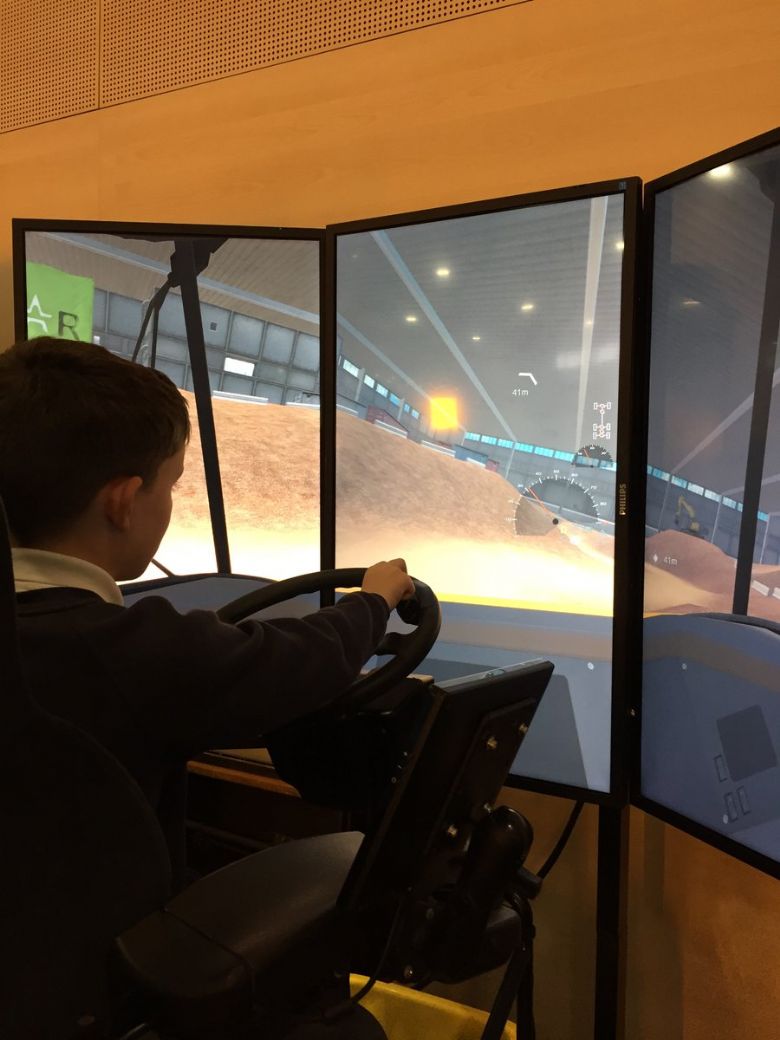Science

Learning to drive a dumper truck at Bring it On! engineering exhibition
Curriculum Intent
It is our intention at GEMS to encourage all young people to have a lifelong curiosity and interest in the sciences. When planning for the science curriculum, we intend for children to have the opportunity, wherever possible, to learn through investigation and discovery, leading to them becoming equipped for life to ask and answer scientific questions about the world around them.
As children progress through the year groups, they build on their skills in working scientifically, as well as on their scientific knowledge, as they develop greater independence in planning and carrying out fair and comparative tests to answer a range of scientific questions.
Each topic is designed to not only fulfil all the requirements of the National Curriculum, but also looks towards to the new GCSEs, helping to lay secure foundations for work in Years 9, 10 and 11. The combination of theory and practical tasks help children to consolidate and retain the science knowledge they have learnt and reinforce key scientific vocabulary from each topic. Our aim is to give all children a strong understanding of the world around them whilst acquiring specific skills and knowledge to help them to think scientifically, to gain an understanding of scientific processes and an understanding of the uses and implications of Science today and for the future.
GEMS Science schemes of work ensure that children have a varied, progressive and well-mapped-out science curriculum that provides the opportunity for progression across the full breadth of the science national curriculum for KS2 and KS3.
In upper Key Stage 2, structured science lessons allow pupils to develop a deeper understanding of scientific ideas and theories. Pupils are encouraged to ask questions, explore their ideas and discuss their findings. The scheme of work develops practical investigative skills, stimulating and challenging all pupils to reach their full potential.
Teaching and learning in Key Stage 3 focusses around the three separate sciences - biology, chemistry and physics. The programme of study helps pupils form connections between these subject areas and become aware of the links between science and other subjects through scientific knowledge and understanding. Pupils will continue to build on the foundation they have created in upper key stage 2 to develop their own understanding of how science affects the constantly changing and developing world around them.
How students are supported in Science
The design and structure of science lessons allows all children, regardless of ability to access the curriculum. Science can be a challenging subject and varieties of methods used to support learners. This can take the form of one-to-one support in lessons, scaffolding for written work and support in practical tasks from peers and staff.
CGP revision guides (KS2 & KS3)
BBC bitesize learning www.bbc.co.uk/bitesize
Frogplay www.frogplay.net/my/login
Educake www.educake.co.uk
Assessment
After every topic, pupils will complete a review to highlight any areas that require further study. At the end of each school term, a final assessment is taken; this data is used to highlight any areas for further development.
Enrichment Opportunities
- Science club – runs every Tuesday lunchtime.
- Scifair 2021 – An opportunity for pupils in year 7 and 8 to submit their own scientific investigations and ideas in a competition run by Newcastle University.
- GEMS Science Fair – coming soon! A school-run version open to all pupils - to be held during British science week March 2022.
- British Science Week – celebrating science innovation and discovery, to be held between the 11th and 20th March 2022. The theme will be ‘Growth’, for more information, visit https://www.britishscienceweek.org/
Curriculum Overview
|
Autumn |
Spring |
Summer |
|
|---|---|---|---|
|
Year 5 |
Safety Changes of State Simple Separation Materials Reversible/Irreversible processes |
Earth Science Earth and Space Simple Electricity |
Life Cycles Living Things and Habitats Animal Classifications Food Webs |
|
Year 6 |
Safety Materials Complex Separating techniques Bunsen burners Dissolving
|
Forces Light |
Life Processes Adaptation Variation Evolution |
|
Year 7 |
Safety Matter Particle model and separating mixtures Reactions Metal and Non-Metal Acid and Alkali
|
Forces Speed and Gravity Energy Heating and Cooling Earth and Space Universe |
Organisms Movement and cells Ecosystems Interdependence and plant reprodution Respiration and photosynthesis |
|
Year 8 |
Safety Matter Periodic table and elements Reactions Investigating chemical changes |
Forces Contact forces and pressure Energy Energy costs and transfer Work Electromagnetism Voltage, resistance and current Magnetism and electromagnetism |
Organisms Breathing and digestions Genes Variation and human reproduction Evolution and inheritance |
